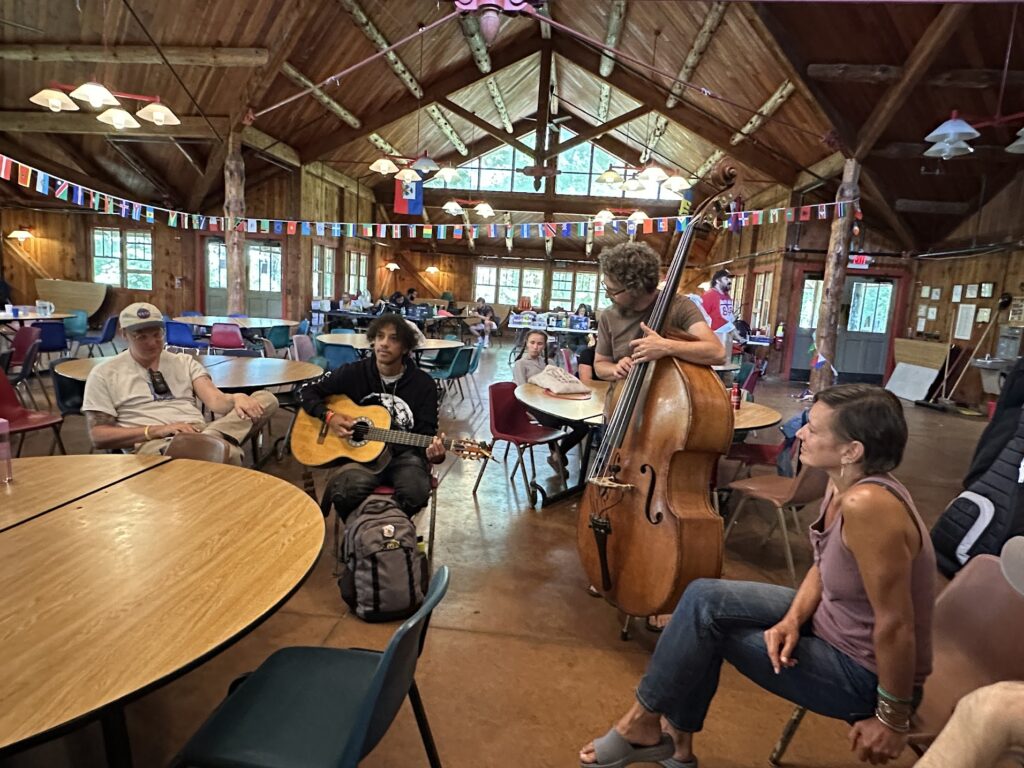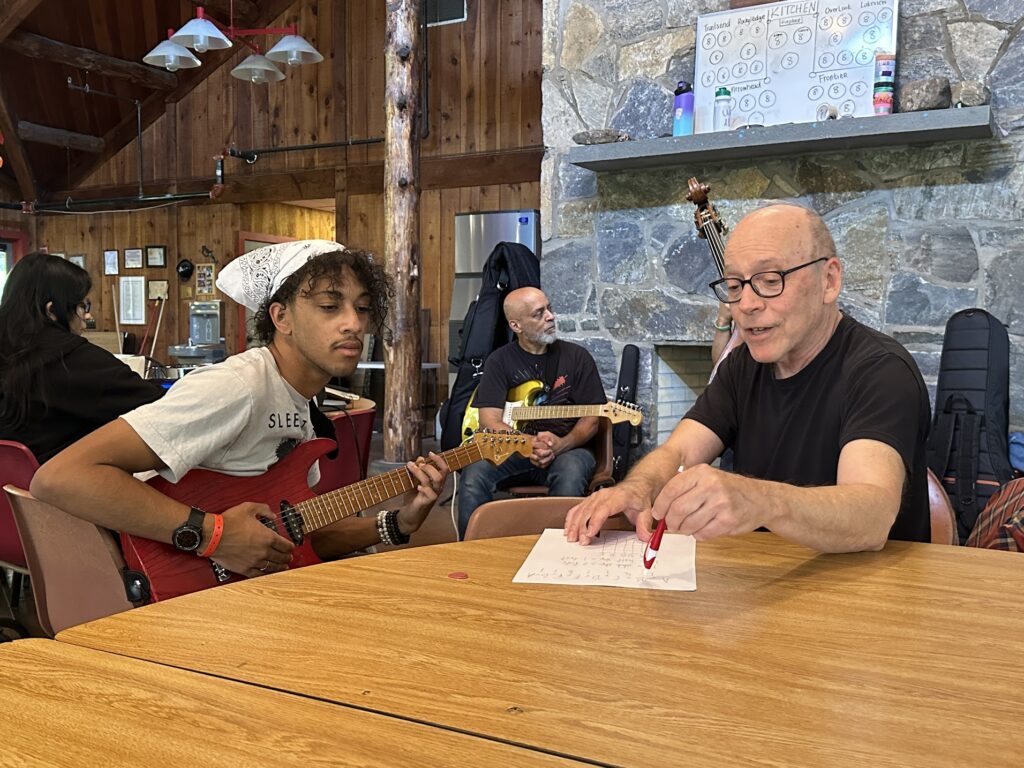At the intersection of artistry, humanity and the driving beat of justice lies the heart of Jen Chapin. As an educator, lifelong activist, and daughter of the late folk legend Harry Chapin, her unique brand of folk-and-jazz fusion is informed by a deep tradition of musical storytelling — and her main source of inspiration is the struggle of those facing oppression.
This calling has, in years past, created a strong kinship with the work and mission of Rural & Migrant Ministry; in fact, WhyHunger, the organization co-founded by her late father in 1975, had awarded a grant for RMM’s Youth Arts Group some 10-plus years ago.
“I feel as though I’ve always known about RMM,” Chapin said while visiting Summer Overnight Leadership Camp the week of August 17. “I feel like it’s always been in the back of my consciousness.”
After crossing paths again with Executive Director Richard Witt during a service at St. Anne’s Episcopal Church in Brooklyn Heights in March, she said, “We connected there, and it was as though we were picking up a conversation from the past.”
Chapin soon agreed to bring her group, the Jen Chapin Trio, to perform at Camp, and to lead a couple of workshops for our youth. The result was electric.
Along with acoustic bass player Stephan Crump — Chapin’s husband of 25 years — and Jamie Fox on electric guitar, the trio performed a mesmerizing set of jazz, blues and folk-infused standards and originals for our nearly 100 campers and staff members. Their overarching theme: the human quest for justice, shown through the lens of Chapin’s experience as a high school Global History teacher in Brooklyn. Drawing from the lessons of colonial India, Nazi Germany and Communist China, the parallels between historical oppression and the political climate in the U.S. today seemed undeniable.
The children remained riveted by the music: Jazz standards such as Cole Porter’s “Anything Goes” and “It’s Too Darn Hot”; a song by Chapin’s father, “Flowers Are Red,” about the pitfalls of conformity; and originals “Hurry Up Sky,” written shortly after 9/11, and “Feed Your Baby,” about the devastating effects of hunger and poverty.
“Hunger isn’t due to not having enough food,” Chapin explained to the campers. “It’s about the choices we make as a society that keep people poor.”
Still, she said, there’s a magic number: When 3.5 percent of the population refuses to cooperate with unjust systems, change can happen.
The trio’s performance of “Satyagraha” — written by Chapin for her high school students, about Mohandas Gandhi and the passive resistance that ultimately liberated colonial India from British rule — brought a hush over the room. The campers sat spellbound by Crump’s bassline melody, his haunting bowing followed by adroit pizzicato.
That transfixion spilled over to the next day, when the trio led a workshop attended largely by Empowerment (high school-age) campers — all of them musicians — that touched on the structure of songwriting: learning theory, playing by ear, finding patterns in intervals and triads, and bringing technology into the process.
Crump, who is unusually expressive for a double-bass player (most bring an aloof, too-cool-for-school demeanor), explained the interplay between the quarter notes he played on the beat with the syncopation of Fox’s layered electric guitar line. Chapin’s alto voice came in next, and she passed her acoustic Ovation guitar, handed down from her father, to 17-year-old Maddox. As Crump and Fox played a kind of call and response, Maddox added lift and rhythm to the sound.
“For me, music is totally collaborative. I just love the bouncing around of ideas and the listening. Music allows you to be transformed and be connected with other people through that process,” Chapin said.
The youth were brimming with questions about capturing the essence of a song, about technique, about crafting lyrics, about conveying a message that resonates. Matthew, 17, spoke about the difficulty of holding onto inspiration that arises in the moment.
“I’ll be out somewhere and I’ll hear music in my mind, and I have an idea, but then later, I lose it,” Matthew said.
Crump offered his experience: “You have to work on it immediately,” he said. “You have to hold onto the context,” whether by keeping music paper handy or singing it into the phone. “You have to find a way to document it.”
Later that afternoon, the trio joined with electric guitar player Tor Snyder, a longtime artist-in-residence at Overnight Camp, to lead a second workshop. This time, the professional musicians and the campers played an extensive jam session, alternating between musical instruction and improvisation.
As Maddox riffed on one of Snyder’s electric guitars, 13-year-old Sophia tried her hand at the keyboards. Crump schooled Sophia in the power of sustaining two notes simultaneously, while Maddox led with an original melody he’s been working on. Fox worked with Maddox on chord progressions and open tuning, discussing the intricacies of their instrument.
“Through art, you can really pursue the truth,” Chapin reflected later. “For me, songwriting is a process of getting at the values and the bigger picture. I’m so glad that every year, it feels more important to me — even as much as I’m doing non-musical things and completely nerding out on history and politics and policy — just keeping the most primal elements of it, just the movement, the authenticity, the groove. Rhythm is inherently anti-fascist. I only hear great music coming out of the places that are seeking truth and justice. On that primal level, it feels like just moving to the music, just singing out, feels important.”




